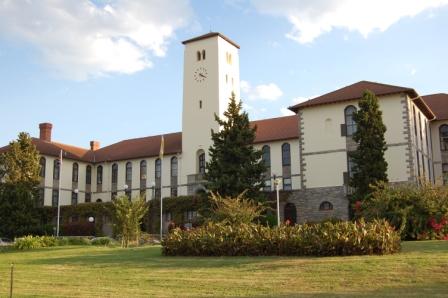
Despite being the smallest university in South Africa, Rhodes has always had a reputation for producing fine research. The per capita research output of the University, as measured by the Department of Higher Education and Training, places Rhodes consistently in the top three research universities in the country, alongside Stellenbosch and UCT.
In line with the Vision 2020 plan which aims to increase postgraduate numbers, and looking to play to its strengths, research is receiving a great deal of attention and encouragement within the University.
Three new research focus areas are being established within the Humanities Faculty, i.e. in Southern African Literature, headed by Professor Dirk Klopper of the English Department; in Critical Sexual and Reproductive Health Studies, headed jointly by Professor Catriona Macleod of the Psychology Department and Professor Louise Vincent of Politics and International Studies; and in Visual and Performing Arts of Africa, led by Professor Ruth Simbao of Fine Art. A fourth research focus area in the Humanities Faculty was initiated last year in the field of Transformative Social Policy.
Each focus area will receive financial support for three years to cover research and Masters, Doctoral and Post-Doctoral scholarships.
Rhodes University already has a very strong research output in the Faculty of Science, with established researchers such as Professor Tebello Nyokong and Prof Christopher McQuaid receiving international attention.
Medicinal Chemistry is a massive research area for the University, examples of which include Prof Nyokong's use of photodynamic therapy in cancer treatment, and the work in cancer stem cell and malaria research being carried out by the BioBRU group.
Allied to Medicinal Chemistry is an area called Marine Biodiscovery, which is starting to grow rapidly. Led by Professor Mike Davies-Coleman in Chemistry and Professor Rosemary Dorrington in Biochemistry, this research focus area looks at medicinal attributes in marine natural products, and is a relatively unique area of study on the African continent.
Marine Biology is a particular strength of Rhodes University with the work of Professor McQuaid and the Southern Ocean Group receiving widespread acclaim.
Entomology is another very visible area, with great success being achieved in using insects to control water weed across the African continent.
Not to be left behind, the Faculty of Education is moving full steam ahead with new or expanded research initiatives in a number of areas: a new Doctoral programme in Higher Education Studies has recently been initiated within the Centre for Higher Education Research, Teaching, and Learning; two NRF funded chairs have been awarded to Rhodes in the area of Mathematics Education; the Environmental Education and Sustainability Unit has recently expanded operations and moved into a purpose-built facility; and new research initiatives in curriculum theory, and in primary and foundation phase education are being mounted.
In an illustration of the University's commitment to top notch research, Rhodes submitted eight proposals in 2010 to the South African Netherlands Research Programme on Alternatives in Development (SANPAD), of which seven were successful – the highest success rate of applying universities.
